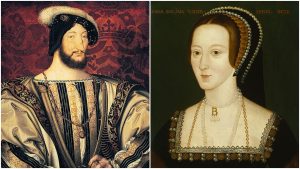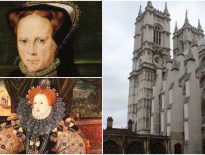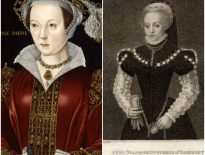 Thank you to Tudor Society member Lynne for asking this question: "When Anne Boleyn was a teenager in the court of Francis I, did she have a bit of a romance going on with the king?"
Thank you to Tudor Society member Lynne for asking this question: "When Anne Boleyn was a teenager in the court of Francis I, did she have a bit of a romance going on with the king?"
I (Claire Ridgway) will answer this one as I have done in-depth research into Anne Boleyn's life, including her time in France.
Anne Boleyn left England in the spring or summer of 1512 to serve at the court of Margaret of Austria in Mechelen. In August 1514, Anne's father, Thomas Boleyn, wrote to Margaret to inform her that Anne had been appointed to serve Mary Tudor, sister of Henry VIII. Mary was travelling to France to marry King Louis XII of France and Anne had been chosen as one of her maids of honour. It is not known when Anne arrived in France, whether it was in time for Mary's marriage on 9th October or whether it wasn't until her coronation in the November, but Anne served Mary from that time until Mary returned to England in the spring of 1515. Anne was retained by the new queen consort of France, Queen Claude, wife of Francis I, and served her until late 1521 when Anne was recalled to England in late 1521.
So, Anne spent seven years in France, serving at the royal court, but was she linked to Francis I romantically during that time?
No reputable contemporary source links her in that way to Francis I. The only sources that do are Nicholas Sander, a Catholic recusant writing in the reign of Elizabeth I, and William Rastall, the Catholic nephew of Sir Thomas More who wrote a sympathetic biography of More in the 1550s. Both men were biased against the Boleyns and their accounts are not backed up by other English sources or by French ones. Sander, who also wrote of Anne having a wen, a projecting tooth and an extra finger, wrote in 1585 that Anne Boleyn was sent to Brie in France at the age of 15 after she had "sinned first with her father’s butler, and then with his chaplain". He went on to write of how she was placed in the care of a French nobleman and then, when she later appeared at the French court, she became known as "the English Mare" and "the royal mule" because of "her shameless behaviour" and her loose morals. This just isn't true. Anne was sent to Mechelen because Margaret of Austria offered her a place at court and then she went on to France because she was appointed to serve Mary Tudor. These positions would not have been offered to a girl who had a bad reputation and she certainly wasn't sent to France for misbehaving. Rastell, who was writing in the 1550s, also wrote that Anne was sent to France where "she behav’d herself so licentiously, that she was vulgarly call’d the Hackney of England, till being adopted to that King’s familiarity, she was termed his Mule." An identical story, so it seems likely that Sander used Rastell as a source, as did Lord Herbert of Cherbury, who quoted Rastell in his 17th-century work Life and Raigne of King Henry the Eighth.
Anne served the pious Queen Claude and her reputation was intact when she returned to England. There was no gossip about any bad behaviour before or after her time in France when she became involved with Henry VIII, and Queen Claude's sister Renée later described Anne as "a virtuous and sage lady". Lancelot de Carles, secretary to the French ambassador in England in 1536, wrote of Anne's time in France, and his words are all in praise of her behaviour:
"At that time, given that she was young
When she came to court, she sagely listened to
The ladies-in-waiting, striving hard to
Imitate them the best way she could..."
He does not say anything negative at all.
Anne's sister, Mary, has also been linked to King Francis I and although some historians take it as fact that she was his mistress, there is no firm evidence that she was. Rodolfo Pio, Bishop of Faenza and a papal nuncio at the court of Francis I, wrote that the French king had known Mary "in France ‘per una grandissima ribalda et infame sopre tutte.'", i.e. that Francis had known Mary in a Biblical sense for "a great prostitute and infamous above all". The bishop, however, was biased against the evangelical Boleyns who had, he felt, caused Henry VIII to break with Rome, and he did not even attempt to hide his disdain for Anne Boleyn, calling her "that woman" instead of "the Queen". In the same letter that he made this claim about Mary, he also wrote of how Anne Boleyn had "pretended to have miscarried of a son, not being really with child, and, to keep up the deceit, would allow no one to attend on her but her sister" in 1536, whereas other reports back up the fact that the queen miscarried a "male child which she had not borne 3½ month" and make no mention of her sister even being at court at that time, never mind serving Anne. It is anti-Boleyn propaganda at best.
I do not believe that Henry VIII would have taken Francis I's cast-offs as his mistress and even those against the king's relationship with Anne did not seek to bring her down by claiming that she had been involved with the King of France first.
While sources cannot be dismissed purely because they are written by enemies of those they are describing, they can be taken with a hefty pinch of salt if they are not corroborated by contemporary sources.
Notes and Sources
- Sander, Nicholas (1585) Rise and Growth of the Anglican Schism.
- The Right Honourable Edward, Lord Herbert of Cherbury (1649) The Life and Raigne of King Henry the Eighth.
- Letters and Papers, Foreign and Domestic, Henry VIII, Volume X.450.
- Lancelot de Carles' poem is found in Georges Ascoli's La Grande-Bretagne Devant L’opinion Française Depuis La Guerre De Cent Ans Jusqu’à La Fin Du XVIe Siècle, and I had it translated into English by Paolo Dagonnier.
- Calendar of State Papers Foreign, Elizabeth, Volume 3: 1560-1561, 870.



Thanks for answering my question Clare . Just imagine if they had tabloids those days Claire, what the headline would have been 🙂
Ha! Yes!
Thank you for a very detailed analysis of Anne and Francis I. Pio also reported that Henry Viii had complained about Anne and her sexual practices learned from France, but then he was a grieving father and said a lot of wild stuff to his friends after Anne lost her unborn son. He was also reporting second or third hand information which made it hardly the best source. I very much doubt Anne would have been made Queen if Henry really believed that she was corrupted as the Mistress of Francis I, for which there is no contemporary evidence.
King Francis was a man who boasted of his conquests and he didn’t boast that he had slept with Anne, but he did claim Mary was his mistress several times. He doesn’t even mention Anne save as a friend and a bright and intelligent woman whom he admired. His boasting about Mary is not real evidence either, it is at best an exaggeration. There is nothing to say that Anne was anything but virtuous during her years in France and outside of this she had a brief romantic relationship with Thomas Wyatt who saw her as his icon and dedicated poetry to her and he loved her. She also had a bethrothal to Henry Percy, Earl of Northumberland which may or may not have been consummated, for the evidence was very sparse and it was broken up by both sets of parents, the King and Cardinal Wolsey and Percy married off to Mary Talbot, Daughter of the Earl of Shrewsbury. When pressed before and at the end of Anne’s marriage to King Henry about his relationship with Anne, Percy swore it was not consummated and they had no contract of marriage. He both protected her reputation and refused to lie under pressure by Thomas Cromwell who wanted him to say this so as Thomas Cranner could annul the King’s marriage with Anne Boleyn. Henry used his own relationship with Mary instead, giving us rare evidence that she was his mistress for a short period of time, before his pursuit of Anne.
As above, any other claims about Anne and France have to be taken with a pinch of salt and she was under the strict supervision of Queen Claude. While it is a little possible that Mary was the Mistress of Francis I for a short period, she most probably was not as active with him as he later boasted. Unfortunately it is not evidence and is not actually supported by other sources.